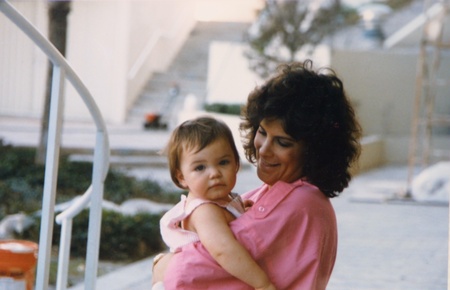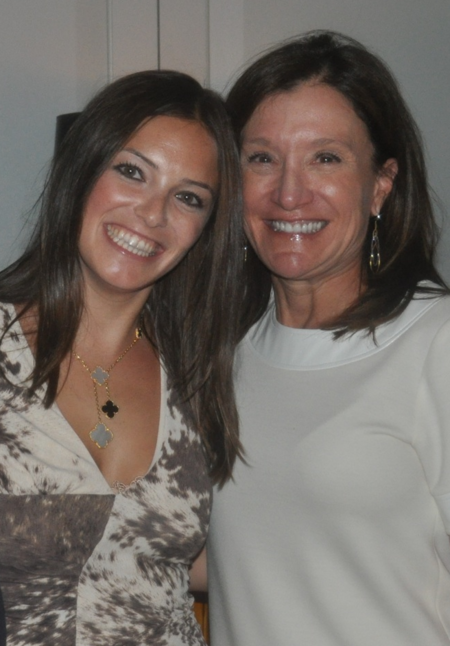I'm sitting in a waiting room with my Mom, Lynne. I'm wearing a hospital gown and feeling extremely weak and uncomfortable. For the past 40 hours, I've been fasting and prepping for my colonoscopy and upper endoscopy. When I look at myself in the mirror, I do not see myself. Instead I see, the memory I have of my Mommy, Sherri, as she was dying from cancer.
When I was 7, my Mommy died just three months after being diagnosed with colon cancer. Eighteen months earlier, she had an improperly performed colonoscopy. I remember being surprised, as when I learned of her illness, I was told she wasn't going to die, and thus, despite all evidence to the contrary, I believed she was going to live.
One year later, my dad remarried. At the time, I was angry and I didn't like my new Mom, whom I refused to call just that. It was difficult for all of us. For years, I could not comprehend how my dad could move on that fast. I know now that change does not mean one has forgotten about the past. My dad was a 35-year-old single dad of three, and he desperately wanted us to have a Mom and a partner with whom he could share his life.
My relationship with my Mom was tenuous -- to put it lightly -- until seven years ago. Now, she is my Mom. Our family becomes offended when others refer to our relationships as "step," as we consider each other like blood. My Mom has two daughters who are biologically hers, which makes it special when people think I'm the most like her. Whether I liked her growing up or not, I am clearly her daughter. I have some of her personality, a lot of her mannerisms, and I am the one who has followed her heart for public service and philanthropy.
Every year, my Mom takes me to Rochester, Minnesota for one week. At the age of 19, I was diagnosed with a genetic mutation that causes cancer. It is called Lynch Syndrome, and it killed my Mommy, my aunt, my grandpa, and my great-grandfather. It means that there is a 75% chance I will develop colon cancer by the age of 65. Since my Mommy's death, and the subsequent deaths of her biological family, my dad has stayed attuned to the reality that there may be (and in fact is) a genetic component to their similar cancers.
Learning that I had the mutation changed my outlook on life. I spent most of my childhood believing I, too, would die at the age of 38. Whether I acknowledged it or not, I was constantly living with the fear of impending death. Colon cancer is one of the most curable cancers if caught early. The first protocol after learning about my condition was to start having yearly colonoscopies, upper endoscopies, CA-125 blood tests and a plethora of other exams. I did these procedures throughout the year, each time finding myself distraught -- I was stuck reliving the sadness and loss I felt when each of my family members died. Every time I went to Sloan Kettering, I found myself feeling more despondent than hopeful as I sat in the waiting room with those suffering from the illness.
Six years ago, something amazing happened. Having had a diagnosis of a dysplastic nevei on my leg, yet another potentially hazardous condition that would have to be monitored yearly, my Mom had a suggestion that would prove to be a game changer. She posited that rather than go for procedures and exams scattered throughout the year, I look into a specialized hospital where I could go for a week and do everything at once. I found that the Mayo Clinic had a team focused on my exact condition, and that one doctor would essentially be the team captain, with all the results from the various doctors who treat me reporting to her. Having seen what this mutation can do, as my Mommy, aunt and grandpa all had different presenting cancers caused by the mutation, I have always believed that someone should be overseeing all of the results, and I did not have that person until I went to the Mayo Clinic.
We have now been to the Mayo Clinic five times. It operates as a well-oiled machine. It typically goes like this: Prior to arrival, I receive a schedule in the mail with all of my appointments. We arrive in Minnesota Monday night, have dinner followed by my first restrictions -- no food and beverage until after morning tests. At 7 a.m. the following day, we report to the desk, where they collect blood and urine specimens. If I'm lucky, my MRI will be next, so as to limit the amount of fasting I have to do. The MRI always scares me, as I feel like I'm in a coffin. I cannot simply fall asleep because they need me to participate by breathing on cue. Next comes a dermatological exam -- a full body scan to check for any abnormalities. Then I return to the room to start prepping for my colonoscopy the next day. Ugh. The anticipation of my colonoscopy, in addition to the discomfort of prepping, is the worst part for me. I always think this time they'll find something. It is the best feeling in the world to wake up from the colonoscopy and hear the doctor tell me that everything was normal. I know this may not always be the case, but at least, should they find a polyp or a tumor, it hopefully will be so early that the only thing to do will be to remove and biopsy it. I immediately go to eat and bask in the relief that I'm done with this part of my screening until next year.
The last day is gynecology. I have an endometrial biopsy, PAP smear and pelvic ultrasound. The biopsy is unbearably painful, and I really wish they would knock me out. The final step is meeting with my fellow. She has received the reports from the lab and from each doctor I have seen during the week. She gives me a physical and discusses the various results. We discuss what tests she will order when I return next year, and reminds me that she will send me a detailed report in the mail. A few weeks later, I am happy to open the envelope from her, read each doctor's report, including her final summary, and know that I can relax until next year.
My week at the Mayo Clinic is stressful, scary and brings up feelings of loss and sadness. Thanks to my Mom, however, these feelings occur once a year, and not multiple times. That is not to say I never experience those feelings, but the occurrences are definitely less frequent. Our trip has become more than medical screening to me. It symbolizes the possibility of change, and the ability for people to forgive each other. My Mom is helping me deal with the realities of my mutation, and ensuring that I do not die from what my Mommy did.
If you told me ten years ago that I would look forward to spending a week alone with my Mom, I would have asked you what drugs you were taking. Now, it is something I look forward to. She spends the week focused on how she can make me more comfortable and how to make the experience less stressful. She is also able to discuss my Mommy with me, and help me consider ways to honor her memory.
Last year, for instance, she asked me about whether I would name my first daughter Sherri, my Mommy's name. I told her that I always had thought I would, but that now I think I would rather name my first daughter a name that starts with "S." For the next week and beyond, she would randomly come up with "S" names to suggest to me. Her ability to do this kind of thing suggests how much she has grown, as I know how hard it was for her to marry my dad so soon after my Mommy's death, particularly because my Mommy's parents were so hard on her. Two weeks ago, she called me excited because she and my dad had cleaned out their closet and found a box of jewelry that was Mommy's, and she knew how happy I would be to have it. It meant so much to me to have her be the one to bring it to me.
What was once a relationship of resentment and anger has been transformed in to one of love and understanding. My Mommy died for reasons out of her control, and my Mom's mother killed herself. It does not take a rocket scientist to see that while emotionally we have both experienced such great loss, we both also have so much love to offer each other. My Mom felt her mother lacked the capacity to truly love her, and I felt the lack of love from a mother -- until the past seven years.

